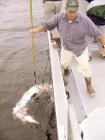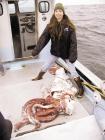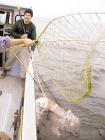


SANTA CRUZ -- Rough seas on the Monterey Bay on Wednesday coughed up what few, even the most dedicated of marine researchers, have ever seen -- the fabled giant squid.
The bruised and bitten remains of what is thought to have been a 25-foot-long squid bore only a vague resemblance to the big-screen adaptation that has choked ships and strangled men. But the animal's mythic proportions and elusive ways were not lost on the crowd of biologists gathered at Santa Cruz harbor to greet the discovery.
"This is a rare find," said John Field, a fishery biologist with the National Oceanic and Atmospheric Administration in Santa Cruz.
Field later said only four or five carcasses have ever been found in California waters.
Santa Cruz researcher Sean Van Sommeran and his crew with the Pelagic Shark Research Foundation discovered the giant squid, or Architeuthis, Wednesday morning, floating roughly 20 miles off the coast of Santa Cruz.
A flock of gulls feeding on the carcass alerted the crew to the remains. Their first thought, said crew members, was that the animal was a seal but after motoring closer to it they recognized the chewed-up squid.
"We were assuming there might still be a predator out there, so we made haste and brought the squid aboard," Van Sommeran said.
Squid experts met Van Sommeran at the docks, where the animal was taken to Long Marine Lab and prepared for a necropsy, scheduled for today.
The animal's cause of death was not immediately known, nor were its dimensions. Based on its mantle size, though, Field said the animal likely approached 25 feet and weighed hundreds of pounds.
Giant squid can grow upward of 50 and 60 feet and weigh up to a ton, according to researchers.
The tentacles of Wednesday's catch, which were as thick as a human leg, were mostly gone and its eyes and several body parts were missing.
"Maybe a shark or sperm whale attacked it," speculated NOAA oceanographer Ken Baltz, who works with Field.
The squid had likely died within the past day or two, Baltz said.
News of the Santa Cruz discovery spread quickly to a worldwide research community hungry for information about the little-understood invertebrate.
"I'm excited to get more data to study," said Eric Hochberg, one of the leading experts on the giant squid and curator of the Department of Invertebrate Zoology at the Santa Barbara Museum of Natural History.
Hochberg said there's likely several squid along the California coast, but because the animal swims at depths of thousands of feet, it's almost never seen and difficult to study.
The giant squid has been caught live on film only once, by Hochberg's associate in Japan, Tsunemi Kubodera.
That's left scientists with only limited specimens of the animal and whatever remains they find in the stomachs of whales to piece together its form and biology.
And that, of course, has left lots to the imagination.
"The animal is just so big and so rare ... it's very easy for people to get a little nervous about what it is, and the stories go from there," Hochberg said.
Contact Kurtis Alexander at 706-3267or kalexander@santacruzsentinel.com.


